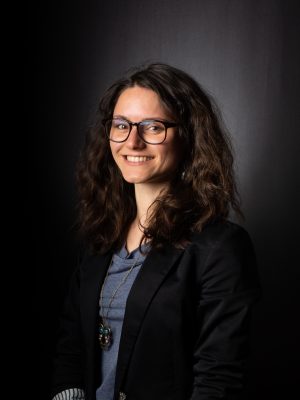Postdoc Spotlight: Laura Giurge

Laura Giurge is featured as part of Cornell’s Postdoc Appreciation Week 2018.
Laura Giurge is from Baia Mare, Romania, and has a PhD in management from Erasmus University Rotterdam. She is affiliated with the Management and Organizations program at the Samuel Curtis Johnson Graduate School of Management, in Cornell’s SC Johnson College of Business.
What is your area of emphasis?
My research focus is on ethics, power, and time. In my research on ethics, I’m particularly interested in using within-person designs to understand the temporal and dynamic fluctuations of ethical and unethical behavior at work. Within-person research provides a deeper and perhaps a more realistic representation of reality because it allows us to answer questions such as why the same employee is helpful and polite at work one day, but makes a racist comment the following day, or why there are more displays of unethical behavior on some days than others. In my research on power, I see value in separating objective power (being in a hierarchical position of power) from subjective power (experienced sense of power) and study how each influences important organizational behaviors such as decision-making. Finally, in my research on time, I seek to understand how the experience of time and temporal cues influence motivation and behavior, as well as perceptions of others. With this research, I aim to address issues such as the potential hidden benefits of delayed feedback for prosocial behavior, the influence of temporal cues on perceptions of entitlement, and the unrealized harmful effects of breaks on creative performance.
Why is this work important?
All three areas of my research are important because they speak to tangible and ongoing issues that each of us might have to deal with, in particular at the workplace. I view ethics, power, and time as largely interconnected. For that reason, insights emerge particularly when I can integrate them within the same project. For instance, in a recent paper with my collaborators from Rotterdam, I looked at how power affects leaders’ tendencies to engage in behaviors that benefit the self at the expense of others. Conventional wisdom would suggest that power corrupts. Yet, in an incentivized experiment, we found that having a position of power (supervising others) merely corrupts leaders’ thinking about ethical issues and that the exercise of power (having control and autonomy over financial resources) encourages self-interested behavior among leaders.
Have you won any awards or fellowships?
Selected awards include, participant (3% acceptance rate), Aspire Young Professionals, Poiana Brasov, Romania; and Semi-finalist, The Falling Walls Lab, University of Groningen.
What inspired you to choose this field of study?
Each of the above-mentioned streams of research has its own story. First, power for me represents having responsibility for my actions and for those who are dependent on me. Such responsibility should arguably not trigger negative behaviors. Yet, the many ethical scandals involving particularly high-power leaders indicate that somewhere along the way responsibility gets lost. My motivation for studying power, therefore, stems from a long-standing desire to understand why individuals are so fascinated with having power, why power corrupts, and whether and how power could be used for advancing common well-being. My interest in ethics and, in particular, in the dynamic and temporal nature of ethical and unethical behavior began with the observation that even people who value and strive to do good end up engaging in unethical behavior, sometimes even without realizing this. Finally, my interest in time slowly began during my Ph.D. when I started learning and using within-person designs to capture variability in individuals’ behaviors and experiences over time. My recent focus on time as an independent stream of research started with the simple observation that people have a tendency to use time as an informational cue that affects not only one’s own behavior, but also how one judges and interacts with others. For instance, a late gesture of gratitude is likely to trigger perceptions of entitlement and individuals might have different expectations of when a favor should be returned, depending on whether one is in a symmetric or asymmetric power relationship.
How has your background influenced your scholarship?
It’s hard to tell. On some level I think I’ve always been interested in observing and understanding human behavior. It was not until my semester abroad at the University of Groningen in the Netherlands that I realized there is a way to actually study human behavior.
What else has influenced your thinking as a researcher or scholar?
One important source of influence is my collaborators. Another source is scholars whose work I admire.
What other hobbies or activities do you enjoy in your spare time?
Too many! I enjoy traveling because it reminds me of what I tend to take for granted and because it often pushes the boundaries of my comfort zone. I also enjoy photography, which goes hand in hand with traveling and with my fondness for details and patterns. Next to photography, I sometimes paint and draw, most recently postcards that I send to my friends back home. I further enjoy reading, running, yoga, and – every now and then – challenging sports like surfing.
Why did you choose Cornell?
I chose Cornell because of its outstanding reputation for producing cutting-edge research. It also represents a unique opportunity to interact with, learn from, and collaborate with top scholars within my research areas. Being at Cornell has further provided me with the opportunity to attend inspiring seminars as well as meet with and learn about the work of various amazing scholars.
What’s next for you?
Finding an assistant professor position at a research institution of my choice so that I can continue my work on ethics, power, and time.
Do you have any advice for current graduate students?
Plenty! But I will stick to one: manage your time well by learning how to recognize what is a priority and what is not, for you to build your own research identity.
